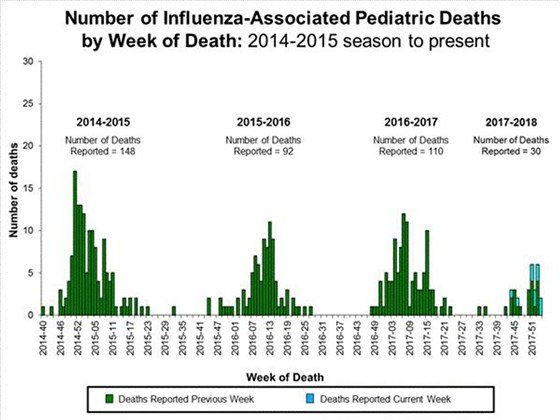
The family of a 12-year-old boy in Florida is grieving after flu is suspected in the child's death on Tuesday. Dylan Winnik had sniffles and was exhausted, symptoms his family initially thought were a cold. Now, they believe it was flu.
Health officials aren't sure yet, but Dylan may be the latest in a growing number of young children dying this year from influenza.
A 6-year-old girl in North Carolina died from flu on Jan. 18, a few days after falling ill. When Emily Muth's breathing become labored, her worried parents called an ambulance. Paramedics told the family Emily was experiencing typical flu symptoms and that she'd be better soon. But a few short hours after the ambulance left, the girl stopped breathing, her family posted on their GoFundMe page.
t's too soon to determine whether the current flu season, which may last until May, will lead to more pediatric deaths than usual. As of Jan. 13, there had been 30 flu-associated fatalities in children, as reported by the Centers for Disease Control and Prevention. The actual number of pediatric deaths may be higher, since it takes a few weeks for CDC to gather the information, and not all states report flu deaths quickly or in the same way.
The CDC will report new data on pediatric deaths on Jan. 26.

The number is likely to go up as the flu season continues, said Dr. John Williams, a professor and division chief of pediatric infectious diseases at the Children's Hospital of Pittsburgh at the University of Pittsburgh Medical Center."Every year in the U.S., somewhere between 100 to 300 pediatric deaths form the flu are reported," Williams said. "And that's likely an underestimate.
We might have more deaths than usual this year. We don't know what's going to happen with the rest of the season. We probably haven't peaked yet.
"The best way to protect children from catching the flu is to vaccinate them, Williams said. Even if the flu vaccine doesn't prevent you from getting sick, "some protection is a lot better than no protection," he said.

Although the vaccine this year isn't a perfect match — its effectiveness at completely preventing the flu from one particularly severe strain has been estimated to range from 10 to 30 percent — the shot can at least lessen symptoms in those who end up getting the flu. The vaccine, which is made from two proteins culled from the surface of killed virus particles, alerts the immune system that invaders might be on the way.
If a person is vaccinated at least two weeks before coming in contact with the flu, then there will be antibodies already made and waiting to do battle.Some 80 to 85 percent of children who died from the flu in past years were not vaccinated, said CDC spokeswoman Kristen Nordlund.
PLENTY OF VACCINE AVAILABLE
If a child's doctor is out of the vaccine, parents shouldn't worry: the CDC says there’s plenty of vaccine for the season.
“Providers might not be able to get the specific brand or presentation they want and may need to select something else or may need to purchase vaccine from another source,” Nordlund said.So even if pediatricians can't get flu shots from their usual suppliers, they'll be able to get the vaccine through other companies.For some, there may be other options.
In some states, pharmacies like CVS, Walgreens and Rite Aid are allowed to give children flu shots. “We are able to administer the flu vaccine to children based on state regulations — which vary,” said Ashley Flower, a spokesperson for Rite Aid, adding that the age at which they can give shots varies widely from state to state.
“And there isn’t a pediatric version of the vaccine — it’s the same flu shot adults receive, but the volume of the dose may be different depending on age and vaccine.”On Thursday, New York Gov. Andrew Cuomo signed an order temporarily allowing pharmacies to give flu vaccines to children, ages 2 to 18, because of a high number of new cases and hospitalizations.
Reports of children dying from flu is frightening, but, overall, flu is not usually an emergency. Doctors do urge parents to get children to an emergency room if they have these symptoms:
- Fast or troubled breathing
- Bluish skin
- If they don’t drink fluids or cannot be awakened.
Adults also need immediate medical help if they have:
- Difficulty breathing or shortness of breath
- Pain or pressure in the chest or abdomen
- Sudden dizziness or confusion
- Severe vomiting